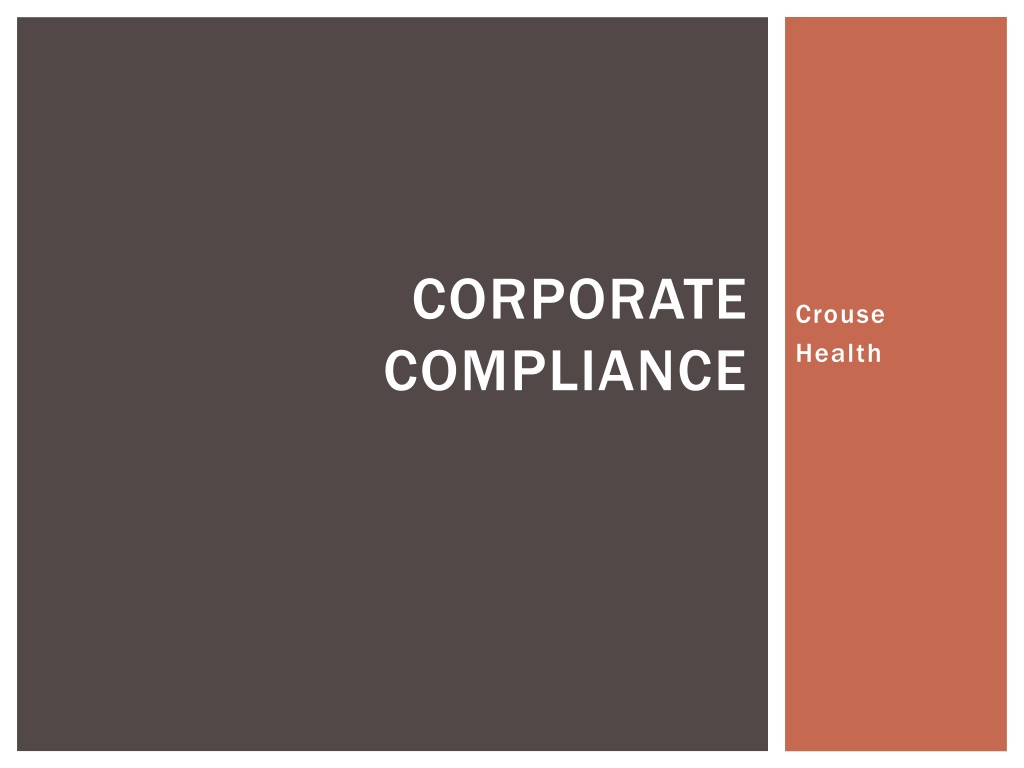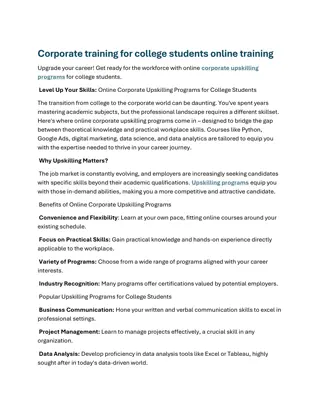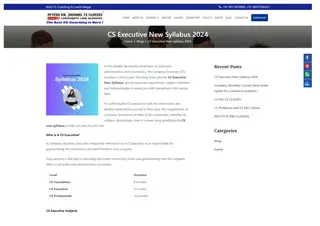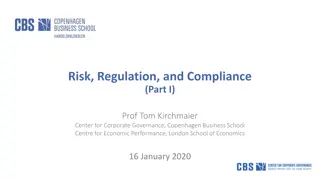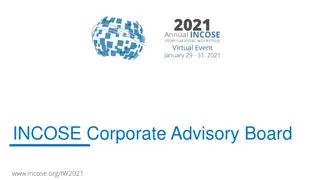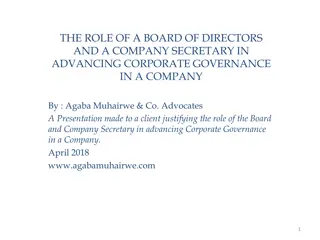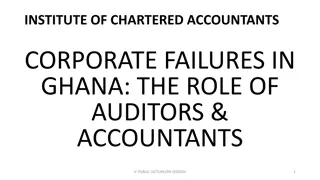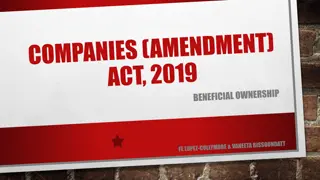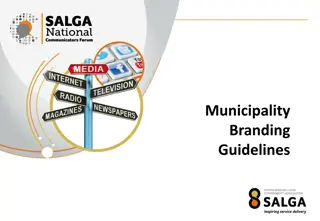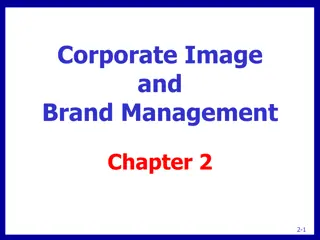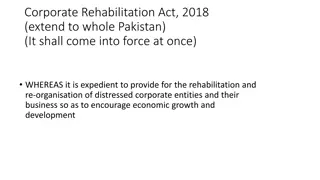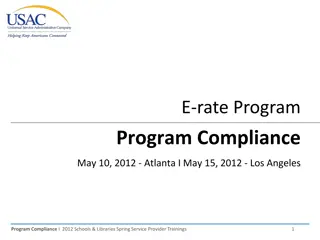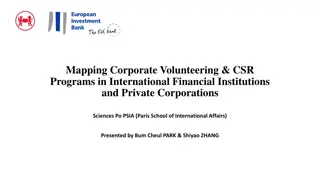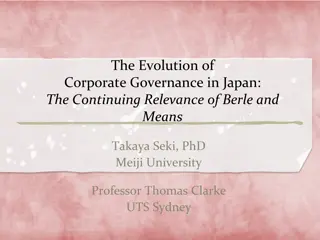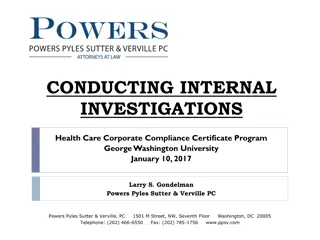Effective Corporate Compliance Program Overview
Corporate compliance is essential to prevent fraud, waste, and abuse within organizations. This program aims to detect and prevent deceptive practices, unnecessary costs, and improper behaviors. Key elements include appointing a Compliance Officer, establishing policies and procedures, providing education and training, monitoring, and establishing clear lines of communication. The Compliance Officer and Committee play crucial roles in overseeing the program's effectiveness and ensuring regulatory compliance.
Download Presentation

Please find below an Image/Link to download the presentation.
The content on the website is provided AS IS for your information and personal use only. It may not be sold, licensed, or shared on other websites without obtaining consent from the author. Download presentation by click this link. If you encounter any issues during the download, it is possible that the publisher has removed the file from their server.
E N D
Presentation Transcript
CORPORATE COMPLIANCE Crouse Health
CORPORATE COMPLIANCE PURPOSE TO PREVENT FRAUD, WASTE & ABUSE FRAUD = deception or misrepresentation an individual or organization makes, where that deception could results in an unauthorized benefit. WASTE = acting in a manner that results in unnecessary cost or consumption of healthcare resources ABUSE = improper or excessive behavior or incidents inconsistent with accepted medical or business practices.
CORPORATE COMPLIANCE Examples of Fraud, Waste & Abuse Examples of Fraud, Waste & Abuse Kickbacks Stark Act Identity Theft Falsifying or forging records/documents Billing/Payment (up-coding, bundling, services not provided) Medical Care (under and over utilization, not medically necessary) Overproduction Material movement, over ordering Accepting gifts/tips Disregarding your professional standards
ELEMENTS OF AN EFFECTIVE PROGRAM Individual named as Compliance Officer and committee established Policies & Procedures and Standards of Conduct Education and Training Auditing and Monitoring Discipline/Sanctions guidelines Lines of Communication (Anonymous methods for reporting issues and concerns) Procedures for responding timely to issues and concerns
COMPLIANCE OFFICER AND COMMITTEE Compliance Officer Compliance Officer Primary responsibilities include: Overseeing the compliance program and evaluating its effectiveness Updating at least annually, policies & procedures, standards of conduct and compliance work plan Reporting at least quarterly to the compliance committee and Board of Directors Investigating matters related to the compliance program, including coordinating internal investigations Compliance/Revenue Cycle Committee Compliance/Revenue Cycle Committee Responsibilities include: Assisting the organization, Senior Leadership and Board of Directors in fulfilling its oversight of the detection and prevention of fraud, waste and abuse, violations involving laws, regulations or policies, and in meeting its fiduciary duties. Meets every 60 days, reports to the Board of Directors quarterly.
CORPORATE COMPLIANCE DEPT Office of Corporate Compliance Katie Shepard, Director/Compliance Officer 315-470-7477 Jeff Robinson, HIPAA Security Officer 315-470-2861 Lauren Hartung, Compliance Specialist 315-470-2997 Sherine Lazarow, Senior Compliance Administrator 315-470-8821 Michelle Bush, Policy & Contract Administrator 315-470-8337 Samantha Bello, Compliance Specialist, CMP 315-470-2368 Dwayne Cleveland, 340B Manager 315-470-3204 Anonymous Compliance Hotline 315-470-7770
POLICIES & PROCEDURES AND STANDARDS OF CONDUCT Policies that relate to Compliance Addresses elements of an effective compliance program Addresses HIPAA All compliance-related policies can be found on the website; Crouse.org Our standards or Code of Conduct can also be found on Crouse.org Look for the Corporate Compliance Handbook Policies and Handbook are reviewed annually
EDUCATION AND TRAINING EXAMPLES EDUCATION GENERAL SPECIALIZED BOARD ORIENTATION Overview Game ANNUAL CBL As requested DEPARTMENT SPECIFIC Management/S-Leadership Coding/HIM Nursing Physicians Orientation to Board Annual As requested
AUDITING AND MONITORING EXAMPLES AUDIT & MONITORING OIG & OMIG Work Plans Internal/External Payer & Charge Audits Governmental Audits Various Compliance Assurance Audits RISK AREAS: Payments, Ordered Services, Governance, Medical Necessity, Quality of Care, Credentialing, Mandatory Reporting, Contractor/Sub oversight
DISCIPLINES AND SANCTIONS All affected individuals must report his/her good faith belief of any suspected or actual violation of applicable local, state or federal law or hospital policies and procedures, including, without limitation, the hospital s compliance program and code of conduct. The hospital has also adopted a strict non-intimidation, non- retaliation stance prohibiting any intimidation and/or retaliation against any person who in good faith reports a suspected or actual violation. Investigations into reported allegations may result in disciplines which follow hospital Human Resource guidelines. The hospital reserves the right to implement any and all appropriate sanctions necessary after determining the level and severity of the violation through the investigation process. Crouse Hospital also reserves the right to review each violation and determine whether the employee will be subject to a law enforcement investigation.
LINES OF COMMUNICATION ANONYMOUS Corporate Compliance Hotline 315-470-7770 Corporate Compliance Reporting Form (on the Intranet page) INFORMATION FOUND ON WEBSITE Handbook Code of Conduct Policies Reporting methods Fact sheets (intranet)
RESPONDING TIMELY TO ISSUES The purpose of an investigation is to identify those situations in which applicable laws and regulations may not have been followed; to facilitate corrective action as necessary; and to implement procedures to ensure future compliance. Regardless of the source of the complaint or concern, the hospital takes potential compliance issues seriously and investigates compliance issues promptly. All investigations will be logged and documented according to policy. The response to an investigation will be determined by the type of noncompliant activity that is suspected and/or verified. The Compliance Officer or his/her designee shall respond to the individual who initially raised the compliance issue directly following the conclusion of the investigation and within the limits of applicable confidentiality laws and regulations. For those concerns received on an anonymous basis, every effort will be made to follow up.
WORKPLAN Annually reviewed and addressed Living document- can be modified in addition to annual review on an as needed basis Shared with Committee and Board Risk-based Categories Auditing Monitoring Training and Education Compliance and Risk Assessments Miscellaneous
FALSE CLAIMS ACT As old as 1863, this Act was originally proposed by Abraham Lincoln to prevent scams against the federal government. Still used today; prescription drug purchase, nursing homes, weapons and defense purchases, natural resource contracts and low income housing. FEDERAL FEDERAL Allows a civil action to be brought against a health care provider who: Knowingly presents, or causes to be presented, a false or fraudulent claim for payment Knowingly makes or uses a false record or statement to get a claim paid Conspires to defraud the government by getting a claim allowed or paid Reckless disregard to the truth or facility of information May 2009, no longer needs to be an intent of getting a false claim paid. False claim cases going to court are now based on whether the false False claim cases going to court are now based on whether the false record or statement was material to getting the claim paid. record or statement was material to getting the claim paid. A provider who receives monies to which they are not entitled, and retains those monies is an overpayment. overpayment.
FALSE CLAIMS ACT, CONT. STATE STATE Similar to federal False Claims Act (technical differences). Medicaid. Recoverable damages are between 2-3 times the value of the amount falsely received. Filer may have to pay the government s legal fees. Allows private individuals to file lawsuits in state court. If suit concludes with payments back to the government, person who started the case can receive monetary compensation.
WHISTLEBLOWERS An individual who chooses to become a whistleblower have rights that are federally protected under whistleblower laws. Whistleblower Protections: Whistleblower Protections: Prohibits an employer from discriminating against an employee in the terms or conditions of his or her employment. The employee is entitled to all relief necessary to make the employee whole (i.e.- 15 -30% of the recovery/settlement/judgment) FCA liability extends to any conspiracy to violate any requirement of the FCA like retaliation against whistleblowers, which is against the law. Federal Enforcement and Recovery Act (FERA) of 2009, allows the government to intervene beyond the statute of limitations beyond the statute of limitations, in an existing qui tam suit by amending a complaint with new allegations. 31 U.S.C 3730 (h)
Q&A 1. An example of Fraud would be: Billing for Services provided Charging for supplies at the correct price Billing Medicaid patients more than other patients (Correct Billing Medicaid patients more than other patients (Correct Answer) Answer) Submitting accurate information on a claim 2. What is not one of the elements of an effective compliance program? Training and education Accurate physician credentialing (Correct Answer) Accurate physician credentialing (Correct Answer) Auditing and monitoring Compliance officer and committee
Q&A 3. Whistleblower protections include all but: Prohibiting employer from discrimination against employee Prohibiting employer from retaliation against employee Allows government to intervene beyond statute of limitations Allows whistleblower to change their work schedule (Correct Allows whistleblower to change their work schedule (Correct answer) answer) 4. Falsifying or forging records is considered: Fraud (Correct Answer) Fraud (Correct Answer) Standard practice Necessary in some situations Acceptable by the government
Q&A 5. An effective compliance program should include disciplines and sanctions. True (Correct Answer) True (Correct Answer) False 6. Following the requirements of an effective compliance program is only necessary for certain employees of the organization. True False (Correct Answer) False (Correct Answer) 7. I must report all suspected or actual violations of federal and state rules, regulations and hospital policies and procedures, including the hospital s compliance program and code of conduct. True (Correct Answer) True (Correct Answer) False
